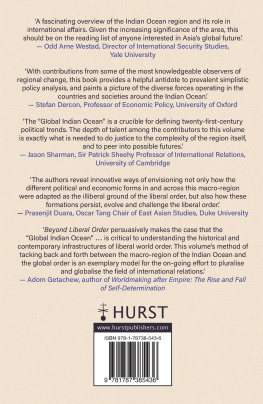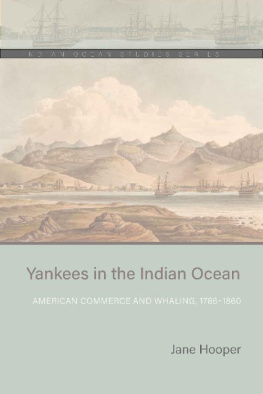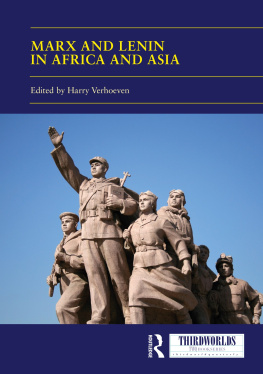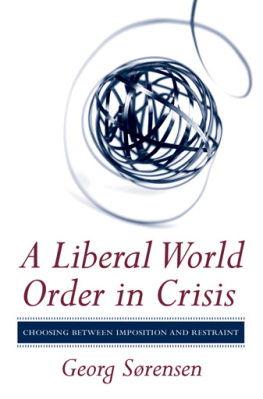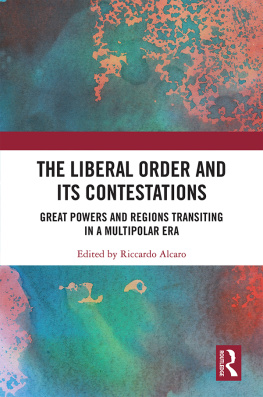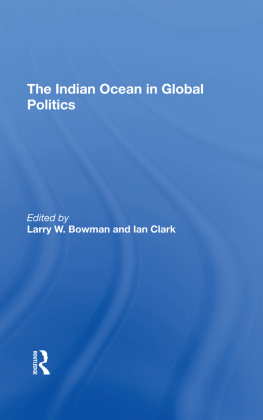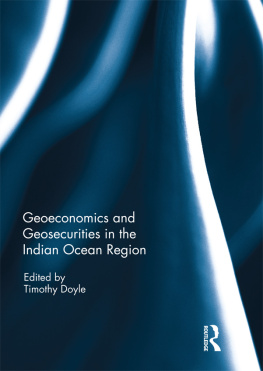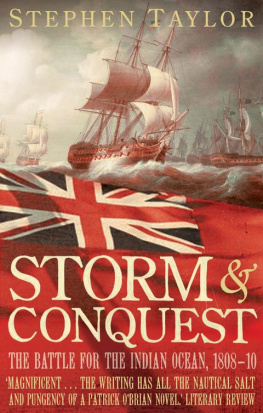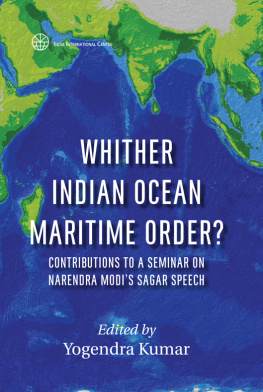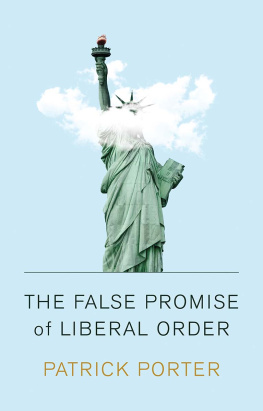Verhoeven Harry - Beyond Liberal Order: States, Societies and Markets in the Global Indian Ocean
Here you can read online Verhoeven Harry - Beyond Liberal Order: States, Societies and Markets in the Global Indian Ocean full text of the book (entire story) in english for free. Download pdf and epub, get meaning, cover and reviews about this ebook. year: 2021, publisher: Hurst Publishers, genre: Politics. Description of the work, (preface) as well as reviews are available. Best literature library LitArk.com created for fans of good reading and offers a wide selection of genres:
Romance novel
Science fiction
Adventure
Detective
Science
History
Home and family
Prose
Art
Politics
Computer
Non-fiction
Religion
Business
Children
Humor
Choose a favorite category and find really read worthwhile books. Enjoy immersion in the world of imagination, feel the emotions of the characters or learn something new for yourself, make an fascinating discovery.
- Book:Beyond Liberal Order: States, Societies and Markets in the Global Indian Ocean
- Author:
- Publisher:Hurst Publishers
- Genre:
- Year:2021
- Rating:4 / 5
- Favourites:Add to favourites
- Your mark:
- 80
- 1
- 2
- 3
- 4
- 5
Beyond Liberal Order: States, Societies and Markets in the Global Indian Ocean: summary, description and annotation
We offer to read an annotation, description, summary or preface (depends on what the author of the book "Beyond Liberal Order: States, Societies and Markets in the Global Indian Ocean" wrote himself). If you haven't found the necessary information about the book — write in the comments, we will try to find it.
Verhoeven Harry: author's other books
Who wrote Beyond Liberal Order: States, Societies and Markets in the Global Indian Ocean? Find out the surname, the name of the author of the book and a list of all author's works by series.
Beyond Liberal Order: States, Societies and Markets in the Global Indian Ocean — read online for free the complete book (whole text) full work
Below is the text of the book, divided by pages. System saving the place of the last page read, allows you to conveniently read the book "Beyond Liberal Order: States, Societies and Markets in the Global Indian Ocean" online for free, without having to search again every time where you left off. Put a bookmark, and you can go to the page where you finished reading at any time.
Font size:
Interval:
Bookmark:

BEYOND LIBERAL ORDER
HARRY VERHOEVEN
ANATOL LIEVEN
(Editors)
Beyond Liberal Order
States, Societies and Markets in the
Global Indian Ocean

HURST & COMPANY, LONDON
First published in the United Kingdom in 2021 by
C. Hurst & Co. (Publishers) Ltd.,
New Wing, Somerset House, Strand, London, WC2R 1LA
Harry Verhoeven, Anatol Lieven and the Contributors, 2021
All rights reserved.
Printed in Scotland
The right of Harry Verhoeven, Anatol Lieven and the Contributors to be identified as the authors of this publication is asserted by them in accordance with the Copyright, Designs and Patents Act, 1988.
A Cataloguing-in-Publication data record for this book is available from the British Library.
ISBN: 9781787385436
www.hurstpublishers.com
CONTENTS
ACKNOWLEDGEMENTS
This book emerged, like many of the most promising journeys, from a set of sprawling conversations that ranged from the virtues of the double harmonic scale and Nyonya cooking to the role of Australian commanders and Colombian, Eritrean and Sudanese mercenaries in the Yemen Civil War. These exchanges began in 2015after we both relocated to the small peninsula-state of Qatar where it was impossible not to be struck by how a country that until a generation ago was cast as one of the Middle Easts most introverted societies was furiously reimagining its past and future in the world. As the launch pad of Qatar Airways global conquest, the host of endless art exhibitions and the 2022 FIFA World Cup, and the base for broadcasting Al-Jazeeras citadel storming bulletins, it is much more than just a shoreline where the ripple effects of transnationalization wash up with unpredictable consequences. It is a city where the pulse of globalizationin all its promises and its dark-sidescan be felt and from whence the process is being further accelerated: where gastronomical traditions are being fused and reinvented by some of the worlds most creative cooks; where the biggest military base in the Middle East sustains what remains of the Pax Americana; and where exiles from civil wars the world over pray next to each other and discuss the future of democracy and justice. Qatar is at the heart of dazzling financial circuits, whether sovereign wealth buying up London and Paris, sprawling charity networks that sustain Islamic proselytization in Java and the African Sahel, or remittances pushing back poverty in the remotest corners of the Philippine Archipelago and the Somali territories.
With circa 90% of the population consisting of foreigners, the countrys extraordinary demographics are sometimes described as a microcosm that reflects the linguistic, cultural and economic cosmopolitanism of the Indian Ocean Worldat once hierarchical and segmented but also equalizing and opportunity creating. Doha constitutes a central node that is at once revitalizing deep, multilayered patterns of imbrication between Africa, Arabia and Asia and experimenting with globe-spanning ambitions and new forms of connectivity through polyglot worldmaking: it is simultaneously an experiment enabled by various episodes of liberal international order and a challenge to the way that concept is usually thought of and analytically deployed by scholars of international relations. While the International Hydrographic Organization does not consider Qatar part of the oceanic rim, it embodies, in many ways, what this edited volume articulates as the Global Indian Ocean: a context from where we can rethink notions of hegemony and the geography of processes of (dis) integration through the mobility of capital, ideas, identities and people that this book is centrally concerned with.
We have been extremely fortunate to have such a stimulating setting shape the contours of this intellectual project. We have also been able to count on the generous support of many in bringing together our own transnational web of scholars to reflect on questions of political order, social stratification and modes of belonging. Inevitably, we can only thank some of them here; nonetheless, the editors and contributing authors are all deeply grateful for the privileged opportunities granted to us and for the challenges and suggestions that have been shared with our team over the course of half a decade.
The Qatar National Research Fund provided important resources to host an international conference and a follow-up workshop that explored our core interest in thinking through and thinking beyond liberal order through a heterogeneity of geographies. Salim Al-Qassmi opened doors in Oman as did Valerie Hnsch, Tamer Abdel Kreem and the team at the Centre for African Studies in Maputo and Markos Tekle and Abdeta Beyene in Addis Ababa. Charles King, Tom Banchoff, Irfan Nooruddin, Sam Potolicchio, Kate Kimble and faculty chair Amira Sombol at Georgetown University lent support to our efforts in Doha and Washington. Hagar Rakhas leadership made our meetings possible in practical terms. Joshua Mitchell was a terrific soundboard early on in the project. Anatol in particular also acknowledges his new colleagues at the Quincy Institute for most interesting discussions of Indian Ocean geopolitics, and Michael Swaine in particular for his insights.
We want to thank various scholars who made part of the oceanic journey with us: Afyare Elmi, Marieme Lo, Amelia Fauzia, Zoha Waseem, Pranab Bardhan, Sharath Srinivasan, Amal Al-Malki, Sana Tariq, Jihane Benamar, Allen Isaacman, Abdullah Baaboud, Kjetil Tronvoll and Mohammed Hassan Ali. Not all of that travelling was smooth sailing; the wide-ranging substantive inputs, personal kindness and good humour of Eckart Woertz, Ricardo Soares de Oliveira, Phil Roessler and Christopher Clapham were even more appreciated than they usually are. Roger Haydon sent excellent comments on the first drafts of the introduction; Russell Martins copy-editing was outstanding. Michael Dwyers enthusiasm proved highly encouraging and gave us the confidence to complete the intellectual task at hand.
Christine Umutoni, Sofia Ahmad, Joan Bordon, Joe Piper, Jorge Codas Thompson Perez and Simukai Chigudu made, as usual, all the differencephysically in Indian Ocean locales or in spirit. So was Tom Matthijs who provided safe anchorage and subtle wit when it was most needed. Ms. Rose could always be counted on.
Finally, this book would not have materialized without the deep, deep love of our respective families. Home is home. To Katja and Mischa, Aliya and Mams, Sasha and Maimuna: thank you so much.
ORDERING THE GLOBAL INDIAN OCEAN
THE ENDURING CONDITION OF THIN HEGEMONY
Harry Verhoeven
Of all the macro-regions of the earth, the Indian Ocean world contains the greatest range of cultures and religions, political systems and commercial networks. Almost three billion humans live in the countries along the shores of the Indian Ocean and another half a billion reside in states adjacent to the oceanic rim. The populations here are, more than anywhere else, young, multilingual and likely to move in their lives from the countryside to the cities. It is in this region that many of the key challenges facing humanity in the next decadesadapting to climate change, responding to deadly pandemics and reducing poverty while creating meaningful employmentwill demand a defining response.
Throughout the ages, land-based empires and the cosmopolitan port cities that supplied them dominated the shores of the globes third biggest body of water and connected them with each otherforming, together with China, the beating heart of the world economy before the advent of capitalism. This mercantile tradition gave it a crucial role in the British Empire too, with India, positioned at the centre of most of its overseas possessions, as the jewel in the imperial crown. The region experienced lengthy economic decline in the 20th century, giving rise to nostalgia for a lost age: the quintessential image of the ocean-faring dhow sailing into the setting sun. Today, however, the Indian Ocean world is once again surging in global importance. Whatever metric one uses, its dynamic character is undeniable: the Indian Ocean has the densest flows of migration in the world; its trade routes, from the Straits of Malacca to the Cape and the Suez Canal, are crucial to global commerce; littoral states have been experiencing some of the fastest economic growth anywhere on the planet in the last thirty years; old and new superpowers alike are rapidly increasing their military presence onshore and offshore; and climate change is already disturbing weather patterns and altering coastlines in this macro-region, which is vulnerable like no other.
Font size:
Interval:
Bookmark:
Similar books «Beyond Liberal Order: States, Societies and Markets in the Global Indian Ocean»
Look at similar books to Beyond Liberal Order: States, Societies and Markets in the Global Indian Ocean. We have selected literature similar in name and meaning in the hope of providing readers with more options to find new, interesting, not yet read works.
Discussion, reviews of the book Beyond Liberal Order: States, Societies and Markets in the Global Indian Ocean and just readers' own opinions. Leave your comments, write what you think about the work, its meaning or the main characters. Specify what exactly you liked and what you didn't like, and why you think so.

